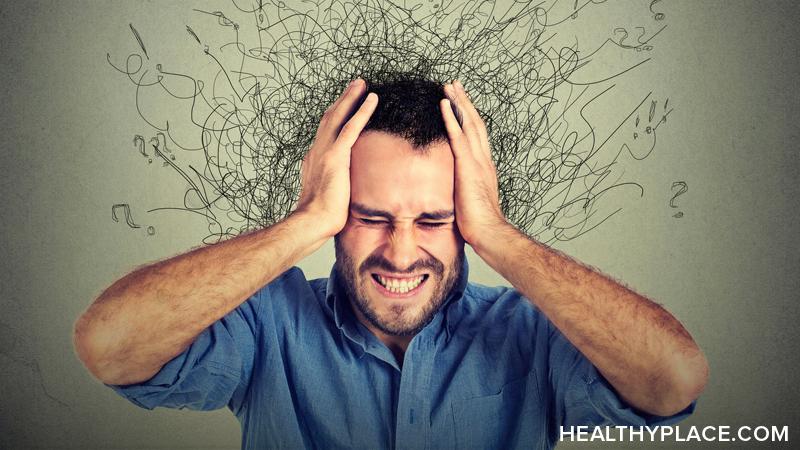Could It Be OCD?
HealthyPlace Mental Health Newsletter
Here's what's happening on the HealthyPlace site this week:
- Could It Be OCD?
- From the HealthyPlace Mental Health Blogs
- Video: Handling Extreme Emotions of Bipolar Disorder
- Most Popular HealthyPlace Articles Shared by Facebook Fans
- Mental Health Quote

Could It Be OCD?
The term OCD, which in reality an acronym for obsessive-compulsive disorder, seems to have become an adjective describing people and behavior. The term OCD is tossed about so causally and dismissively that it has become confusing (True OCD is More than a Compulsion for Neatness). Could you be OCD?
A very important clarification: No one is OCD. OCD isn't a descriptive adjective. OCD is a mental health disorder described in the American Psychiatric Association's (2013) Diagnostic and Statistical Manual of Mental Disorders, Fifth Edition (DSM-5). People have, or they experience OCD. No one is his or her disorder.
According to the Anxiety and Depression Association of America, approximately two million Americans have OCD, or about one percent of the population. Yet far more than that describe themselves or each other "as" OCD. Could your (or someone else's) habits really be OCD? OCD:
- is more than a penchant for neatness
- is more than a need to triple-check that you locked the door
- involves obsessive, unwanted, intrusive, and anxiety-provoking thoughts
- involves compulsions, repeated actions done to eliminate the obsessions; these are very time-consuming
- is life-limiting
If someone describes you as OCD and you fit the above criteria, it could be OCD. A mental health professional will help you sort it out. But if you don't have the key OCD symptoms of life-limiting, intrusive obsessions and compulsions, most likely OCD is a meaningless adjective.
Related Articles Dealing with OCD
Your Thoughts
Today's Question: If you or someone you know lives with OCD, bipolar disorder, or any other mental health disorder, how do you react/respond if you hear someone use one of these terms casually? We invite you to participate by sharing your thoughts, knowledge, or experiences on the HealthyPlace Facebook page and on the HealthyPlace Google+ page.
From the HealthyPlace Mental Health Blogs
On all our blogs, your comments and observations are welcomed.
- Thriving with a Daily Routine
- 3 Ways Eating Disorders Affect Sex
- Professionals Should Talk About Trump’s Mental Health
- Is It Age-Related Behavior or Mental Illness?
- From Grief to Hope: Parenting a Child With Mental Illness
- Mental Health Stigma and Judgment–It’s a Bipolar Pity-Party
- Using Emergency Rooms as Mental Health Wards Doesn’t Work
- Binge Eating Disorder and Depression Made Food My One Friend
- Call the Police in a Mental Health Crisis as a Last Resort
- How to Stop Ruminating on Memories of Mental Health Stigma
- Don’t Let Anxiety Ruin Your Relationships
- Create a Depression Routine So You Cope and Live Well
- Manage Self-Harm Urges with the Calm Harm App
- Surviving Life Transitions in a Marriage with Mental Illness
Feel free to share your thoughts and comments at the bottom of any blog post. And visit the mental health blogs homepage for the latest posts.
------------------------------------------------------------------
From HealthyPlace YouTube Channel
Handling Extreme Emotions of Bipolar Disorder
Because of bipolar disorder, I experience emotional extremes. I’m not referring to bipolar moods-mania and depression, but rather I overreact to certain situations.
------------------------------------------------------------------
Most Popular HealthyPlace Articles Shared by Facebook Fans
Here are the top 3 mental health articles HealthyPlace Facebook fans are recommending you read:
- Ten Tools That Help Relieve Panic Attacks
- Stop Minimizing Mental Illness: Worst Things to Say
- When Depression Causes a Lack of Motivation
If you're not already, I hope you'll join us/like us on Facebook too. There are a lot of wonderful, supportive people there.
------------------------------------------------------------------
Mental Health Quote
"The only thing more exhausting than being depressed is pretending that you're not."
Read more depression quotes.
------------------------------------------------------------------
That's it for now. If you know of anyone who can benefit from this newsletter or the HealthyPlace.com site, I hope you'll pass this onto them. You can also share the newsletter on any social network (like facebook, stumbleupon, or google+) you belong to by clicking the links below. For updates throughout the week, circle HealthyPlace on Google+, follow HealthyPlace on Twitter or become a fan of HealthyPlace on Facebook. Also, check out HealthyPlace on Pinterest and share your mental health pins on our Share Your Mental Health Experiences board.
APA Reference
Peterson, T.
(2017, March 1). Could It Be OCD?, HealthyPlace. Retrieved
on 2026, February 9 from https://www.healthyplace.com/other-info/mental-health-newsletter/could-it-be-ocd
